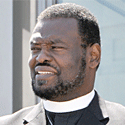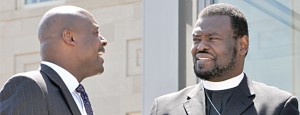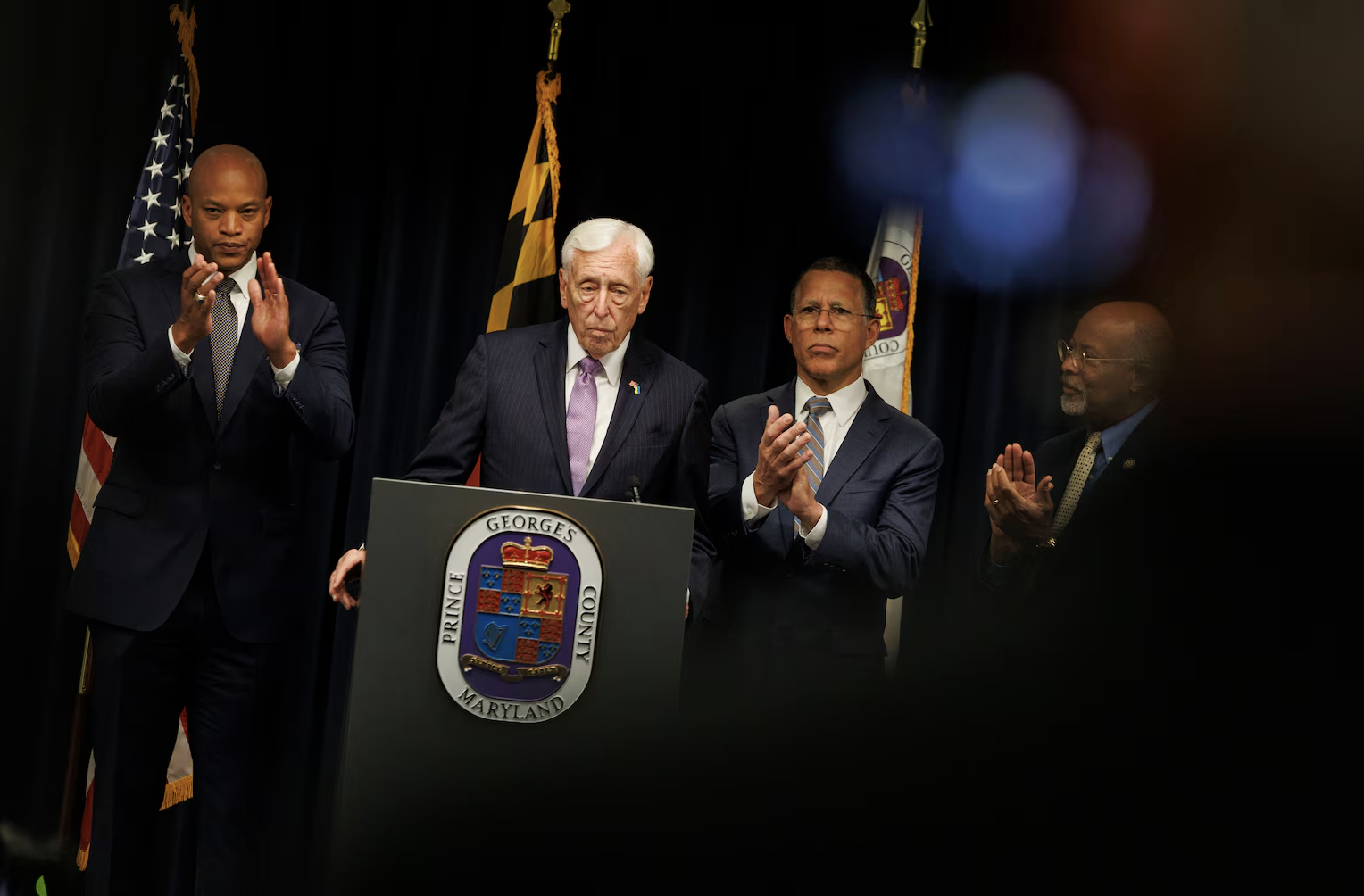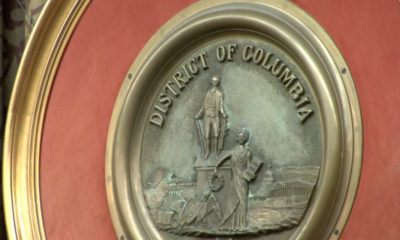Local
D.C. Appeals Court hears gay marriage case
City defends law halting effort to repeal same-sex marriage law


Same-sex marriage opponents Rev. Anthony Evans, left, and Bishop Harry Jackson talk Tuesday outside the D.C. Court of Appeals. A case before the court could force the city to put its same-sex marriage law before voters in a ballot initiative. (Washington Blade photo by Michael Key)
In what legal observers called an unusual development, the full nine-judge D.C. Court of Appeals heard oral arguments Monday for a lawsuit seeking to force the city to put its same-sex marriage law before voters in a ballot initiative.
At issue is whether a 1970s amendment to the D.C. City Charter that allows voters to pass or repeal laws through an initiative or referendum can legally include a provision banning such ballot measures if they would take away rights from minorities.
The City Council added the provision to the charter amendment at the request of gay activists. The effort by same-sex marriage opponents to challenge the provision represents the first time it has been seriously questioned in more than 30 years.
All but two of the judges asked pointed questions that appeared to challenge the legal arguments presented by the lawyers on both sides of the case, taking on the role of devil’s advocate.
“The court asked a variety of probing questions, as they should have,” said Thomas Williamson, an attorney with Covington & Burling, which filed a friend of the court brief on the side of the D.C. government in defense of the law restricting ballot measures.
“But it seemed that a consistent theme in their questions was a sensitivity to the importance of protecting civil rights of a vulnerable minority, which is really what this case is about here — the right of same-sex couples to enjoy marriage and have the same status for their marriage as all other citizens of the District,” Williamson said.
Five of the nine judges, including Chief Judge Eric Washington, were appointed by President George W. Bush. President Bill Clinton appointed the remaining four.
Williamson and local gay rights attorney Mark Levine said it’s unusual for the Court of Appeals to hear a case for the first time en banc, or with all of its judges, instead of its usual practice of assigning a three-judge panel to hear a case.
One significant outcome of an en banc case is that the full court has the authority to overturn previous decisions it handed down either en banc or through a three-judge panel if the previous rulings would interfere with its intentions in a current case. Williamson said one possible ruling the court might overturn in the current case over the D.C. same-sex marriage law is the 1990s case known as Dean v. the District of Columbia.
In that case, the appeals court rejected a claim by a gay male couple that the city’s existing marriage law allowed for the issuance of marriage licenses to same-sex couples because of the Human Rights Act’s ban on discrimination based on gender and sexual orientation. At that time, the court ruled that the marriage law restricting marriages to opposite-sex couples took precedence over the Human Rights Law.
In recent years, gay rights attorneys and D.C. government officials have argued that the Dean decision was no longer relevant because the City Council had since made sweeping changes to the marriage law, providing extensive rights, including marriage, for same-sex couples.
Austin Nimocks, legal counsel for the Alliance Defense Fund, a Christian litigation group, argued the case Tuesday for Bishop Harry Jackson and other local opponents of same-sex marriage who filed the lawsuit seeking a ballot measure to overturn the gay marriage law.
Jackson initially filed his lawsuit before the D.C. Superior Court last fall, after the D.C. Board of Elections & Ethics rejected his application for a voter initiative calling for defining marriage in D.C. as the union between one man and one woman. The board ruled that the initiative would violate the provision added to the referendum and initiative law that bans such ballot measures if they would result in discrimination prohibited by the Human Rights Act.
The effect of the initiative, if approved by voters, would be to repeal the same-sex marriage law that the City Council passed and Mayor Adrian Fenty signed in December. The law took effect March 3 after it cleared a required 30 legislative day review by Congress.
Jackson then filed suit seeking to overturn the election board’s decision. In January, Superior Court Judge Judith Macaluso upheld the election board’s decision, saying the law cited by the city to ban such ballot measures was valid.
Tuesday’s hearing before the D.C. Court of Appeals came about after Jackson and his supporters appealed Macaluso’s ruling.
Nimocks sidestepped reporters’ questions about the appeals court judge’s comments, including those who challenged his arguments. He said after the hearing that his side is correct in claiming the 30-year-old provision in the D.C. Charter barring certain ballot measures violates the full District of Columbia Charter.
The city’s charter is considered to be equivalent to a state constitution, and legal experts say all laws enacted by the City Council and signed by the mayor must be consistent with any restrictions or limits set by the charter.
Nimocks argued before the court Tuesday that the charter amendment that created the city’s voter initiative and referendum system sets just one restriction on such ballet measures: a ban on voters directly deciding on matters related city funding or taxes.
He said the charter amendment, which the City Council passed and Congress approved, doesn’t allow further restrictions that would prevent a ballot measure seeking to curtail minority rights.
“The people have a right to vote that’s guaranteed by the District of Columbia Charter,” he said. “And the City Council cannot amend the charter. They cannot do anything to undermine the people’s right to vote.”
In his written brief, Nimocks also argued that the Dean case was still a factor that the appeals court should consider.
Todd Kim, the D.C. Solicitor General who argued on behalf of the city, told the court the charter amendment establishing the initiative and referendum system gives the City Council authority to make some changes in the system to carry out its “purpose.”
Kim noted that the Council wrote the charter amendment and that part of the purpose in creating it was to place certain restrictions consistent with longstanding city policy, including policies related to rights of minorities. The D.C. Human Rights Act, which was in place at that time, included a ban on discrimination based on sexual orientation, Kim said, indicating the city’s overall policy and purpose was to protect the rights of gays and lesbians along with other minorities.
He also noted that Congress approved the charter amendment through its normal 30 legislative day review, further solidifying its status as a valid law.
In another development that pleased gay activists attending Tuesday’s appeals court hearing, Judge Phyllis Thompson, a Bush appointee, pointed out that D.C. voters approved a statehood constitution in the early 1980s that included a provision banning initiatives and referenda that would take away rights of minorities, including gays.
Thompson appeared to be challenging Nimocks’ arguments that voters should have the right to decide on the gay marriage law by noting that D.C. voters approved the ban on ballot measures seeking to take away rights for gays and others.
Legal experts have said the statehood constitution passed by voters had no legal standing because D.C. statehood — which many D.C. residents favored in the 1980s — could not come about without approval by Congress. Congress never took the proposal seriously.
But Levine and Williamson said Thompson’s decision to raise the issued shows that she, and possibly a number of her colleagues on the appeals court, are sympathetic to the city law banning ballot measure that would take away rights, including the right of same-sex couples to marry in D.C.
“Marriage equality has already brought critical rights and responsibilities to hundreds of same-sex couples, yet outside forces are determined to undo our progress,” said Aisha Mills, president of the Campaign for All D.C. Families, one of the local groups that lobbied for a same-sex marriage law.
“As the courts have uniformly recognized in upholding D.C.’s comprehensive anti-discrimination laws, no one should have to have their marriages — or any of their civil rights — put to a public vote,” she said.
Jackson was among more than a hundred spectators to attend Tuesday’s appeals court hearing. The spectators appeared to be equally divided between same-sex marriage opponents and supporters, with many of the city’s prominent LGBT activists in attendance.
In addition to Washington and Thompson, the appeals court members include Judges Vanessa Ruiz, Inez Smith Reid and Stephen Glickman, who are Clinton appointees, and Judges John Kramer, John Fisher, Anna Blackbourne-Rigsby and Kathryn Oberly, who are Bush appointees.
Court observers say a decision on the marriage case could come anytime between the next several months and more than a year. The losing party could appeal the case to the U.S. Supreme Court, but many legal observers believe the high court would be unlikely to take the case.
Virginia
Gay Va. State Sen. Ebbin resigns for role in Spanberger administration
Veteran lawmaker will step down in February

Alexandria Democrat Adam Ebbin, who has served as an openly gay member of the Virginia Legislature since 2004, announced on Jan. 7 that he is resigning from his seat in the State Senate to take a job in the administration of Gov.-Elect Abigail Spanberger.
Since 2012, Ebbin has been a member of the Virginia Senate for the 39th District representing parts of Alexandria, Arlington, and Fairfax counties. He served in the Virginia House of Delegates representing Alexandria from 2004 to 2012, becoming the state’s first out gay lawmaker.
His announcement says he submitted his resignation from his Senate position effective Feb. 18 to join the Spanberger administration as a senior adviser at the Virginia Cannabis Control Authority.
“I’m grateful to have the benefit of Senator Ebbin’s policy expertise continuing to serve the people of Virginia, and I look forward to working with him to prioritize public safety and public health,” Spanberger said in Ebbin’s announcement statement.
She was referring to the lead role Ebbin has played in the Virginia Legislature’s approval in 2020 of legislation decriminalizing marijuana and the subsequent approval in 2021of a bill legalizing recreational use and possession of marijuana for adults 21 years of age and older. But the Virginia Legislature has yet to pass legislation facilitating the retail sale of marijuana for recreational use and limits sales to purchases at licensed medical marijuana dispensaries.
“I share Governor-elect Spanberger’s goal that adults 21 and over who choose to use cannabis, and those who use it for medical treatment, have access to a well-tested, accurately labeled product, free from contamination,” Ebbin said in his statement. “2026 is the year we will move cannabis sales off the street corner and behind the age-verified counter,” he said.
Maryland
Steny Hoyer, the longest-serving House Democrat, to retire from Congress
Md. congressman served for years in party leadership

By ASSOCIATED PRESS and LISA MASCARO | Rep. Steny Hoyer of Maryland, the longest-serving Democrat in Congress and once a rival to become House speaker, will announce Thursday he is set to retire at the end of his term.
Hoyer, who served for years in party leadership and helped steer Democrats through some of their most significant legislative victories, is set to deliver a House floor speech about his decision, according to a person familiar with the situation and granted anonymity to discuss it.
“Tune in,” Hoyer said on social media. He confirmed his retirement plans in an interview with the Washington Post.
The rest of this article can be found on the Baltimore Banner’s website.
District of Columbia
Kennedy Center renaming triggers backlash
Artists who cancel shows threatened; calls for funding boycott grow

Efforts to rename the Kennedy Center to add President Trump’s name to the D.C. arts institution continue to spark backlash.
A new petition from Qommittee , a national network of drag artists and allies led by survivors of hate crimes, calls on Kennedy Center donors to suspend funding to the center until “artistic independence is restored, and to redirect support to banned or censored artists.”
“While Trump won’t back down, the donors who contribute nearly $100 million annually to the Kennedy Center can afford to take a stand,” the petition reads. “Money talks. When donors fund censorship, they don’t just harm one institution – they tell marginalized communities their stories don’t deserve to be told.”
The petition can be found here.
Meanwhile, a decision by several prominent musicians and jazz performers to cancel their shows at the recently renamed Trump-Kennedy Center in D.C. planned for Christmas Eve and New Year’s Eve has drawn the ire of the Center’s president, Richard Grenell.
Grenell, a gay supporter of President Donald Trump who served as U.S. ambassador to Germany during Trump’s first term as president, was named Kennedy Center president last year by its board of directors that had been appointed by Trump.
Last month the board voted to change the official name of the center from the John F. Kennedy Memorial Center For The Performing Arts to the Donald J. Trump And The John F. Kennedy Memorial Center For The Performing Arts. The revised name has been installed on the outside wall of the center’s building but is not official because any name change would require congressional action.
According to a report by the New York Times, Grenell informed jazz musician Chuck Redd, who cancelled a 2025 Christmas Eve concert that he has hosted at the Kennedy Center for nearly 20 years in response to the name change, that Grenell planned to arrange for the center to file a lawsuit against him for the cancellation.
“Your decision to withdraw at the last moment — explicitly in response to the Center’s recent renaming, which honors President Trump’s extraordinary efforts to save this national treasure — is classic intolerance and very costly to a non-profit arts institution,” the Times quoted Grenell as saying in a letter to Redd.
“This is your official notice that we will seek $1 million in damages from you for this political stunt,” the Times quoted Grenell’s letter as saying.
A spokesperson for the Trump-Kennedy Center did not immediately respond to an inquiry from the Washington Blade asking if the center still planned to file that lawsuit and whether it planned to file suits against some of the other musicians who recently cancelled their performances following the name change.
In a follow-up story published on Dec. 29, the New York Times reported that a prominent jazz ensemble and a New York dance company had canceled performances scheduled to take place on New Year’s Eve at the Kennedy Center.
The Times reported the jazz ensemble called The Cookers did not give a reason for the cancellation in a statement it released, but its drummer, Billy Hart, told the Times the center’s name change “evidently” played a role in the decision to cancel the performance.
Grenell released a statement on Dec. 29 calling these and other performers who cancelled their shows “far left political activists” who he said had been booked by the Kennedy Center’s previous leadership.
“Boycotting the arts to show you support the arts is a form of derangement syndrome,” the Times quoted him as saying in his statement.
-

 National4 days ago
National4 days agoWhat to watch for in 2026: midterms, Supreme Court, and more
-

 Colombia5 days ago
Colombia5 days agoBlade travels to Colombia after U.S. forces seize Maduro in Venezuela
-

 Virginia5 days ago
Virginia5 days agoLGBTQ groups to join Spanberger inaugural parade
-

 Minnesota5 days ago
Minnesota5 days agoTim Walz drops out of Minn. governor’s race


















